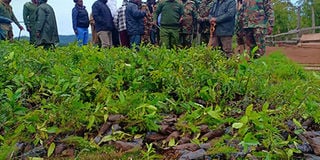Maasai Mau to get forest cover boost with tons of tree seeds

Environment CS Keriako Tobiko (2nd right) during a tour of the Mau on October 31, 2019 to check on the preparedness of the planned tree planting. Kefri will plant more than four tonnes of tree seeds in Maasai Mau Forest. PHOTO | GEORGE SAYAGIE | NATION MEDIA GROUP
What you need to know:
- Mr Cheboiwo said the parastatal expects to undertake aerial seeding of almost 3,500 hectares.
- The aerial seeding of the mapped 4,000 hectares will cost an average Sh15 million.
- He appealed to individuals, companies and groups to join Kefri and financially support the aerial seeding.
The Kenya Forestry Research Institute (Kefri) will plant more than four tonnes of tree seeds in the recently launched rehabilitation of the 22,000 hectares of the Maasai Mau Forest reclaimed last week.
The seeds will be sowed by spraying them from the air.
Kefri Director Joshua Cheboiwo said the parastatal expects to undertake aerial seeding of almost 3,500 hectares.
“If these seeds germinate, we expect to get up to 19,700 seedlings from the area, and that will speed up the regeneration of the forest,” Mr Cheboiwo said.
4,000 HECTARES
Speaking on the side-lines of the tree planting in the forest on Friday, Mr Cheboiwo said aerial seeding of the mapped 4,000 hectares will cost an average Sh15 million to plant 20,000,000 million seedlings, and that the work will take three days or a week at most.
He said aerial seeding is a more efficient way of rehabilitating the forest, with a 75 percent chance of survival and is ideal for reseeding large open spaces and areas that are inaccessible or with rough terrain.
“This technique is cost-effective and, therefore, saves time and money compared with conventional planting. We believe it is the quickest and perhaps the most cost-effective method of achieving and maintaining the recommended 10 percent tree cover by 2022 and also meeting the country’s target of African Landscapes Restoration Initiative 100 of restoring 5.5 million hectares of degraded land in Kenya,” said Mr Cheboiwo.
COST PER TREE
He added that they expect to plant more than 10 million seedlings in the Maasai Mau at an average cost of Sh50 each, with each seedling costing about Sh30 and Sh20 for labour.
“This translates to Sh50 million, excluding mobilisation, transporting the seedlings, supervision and time taken to raise the seedlings.
Further, assuming that 5,000 seedlings are planted manually per day, it would take approximately six years or more to fully replant the Maasai Mau only,” he said in an interview with the Nation.
Mr Cheboiwo said aerial seeding is not new and that it has been used in other countries with considerable success.
APPEAL
He appealed to individuals, companies and groups to join Kefri and financially support aerial seeding of the millions of hectares of degraded areas to speed up the restoration of the country’s forest cover.
He said that under the 10 percent tree cover strategy, Kefri has proposed to conduct aerial seeding over 4,000 hectares of degraded forest land, open-gapped and fire-ravaged areas in the Maasai Mau, Eburru (500 hectares), Aberdare (2,500 hectares) and Mt Kenya forests (3,000 hectares).
According to Kefri Senior Deputy Director for Research and Development Jane Njuguna, 13 species of seeds have been selected for aerial seeding in the Maasai Mau. These are cape chestnut, moringa, mukinduri, forest dombeya, African redwood, pencil cedar, mama mutere, Nile tulip, black ironwood, podo, parasol tree, Meru oak and African satinwood.
13 SPECIES
Dr Njuguna said 1,981 kilos of the 13 species will be broadcast in the Masai Mau Forest.
“The 1,981 kilos are estimated to have approximately 60 million individual seeds, and will yield an estimated 30 million seedlings at a conservative germination rate of 50 percent. The effective stocking rate, discounting for damages, losses and predation by birds and rodents, is calculated to be approximately 75,000 seedlings per hectare,” she added.
The first aerial seeding was carried out in Block 1 of the Maasai Mau in September 2018, led by Narok Senator Ledama ole Kina and supported by Kefri, the Kenya Forest Service, Seed Balls Kenya and Farmland Aviation Kenya Ltd.
It covered about 1,400 hectares in just two hours.
Kefri said good germination was achieved.





